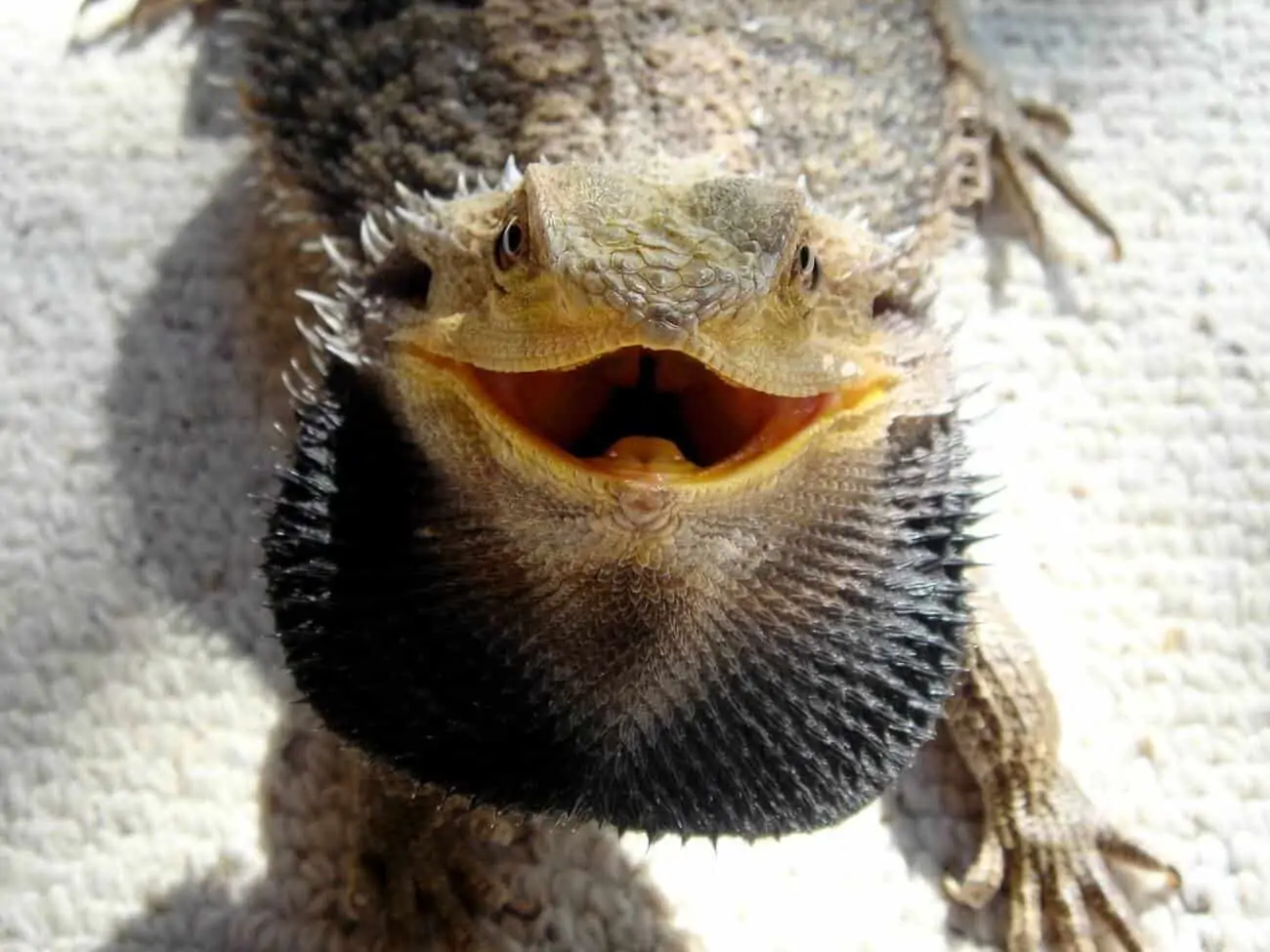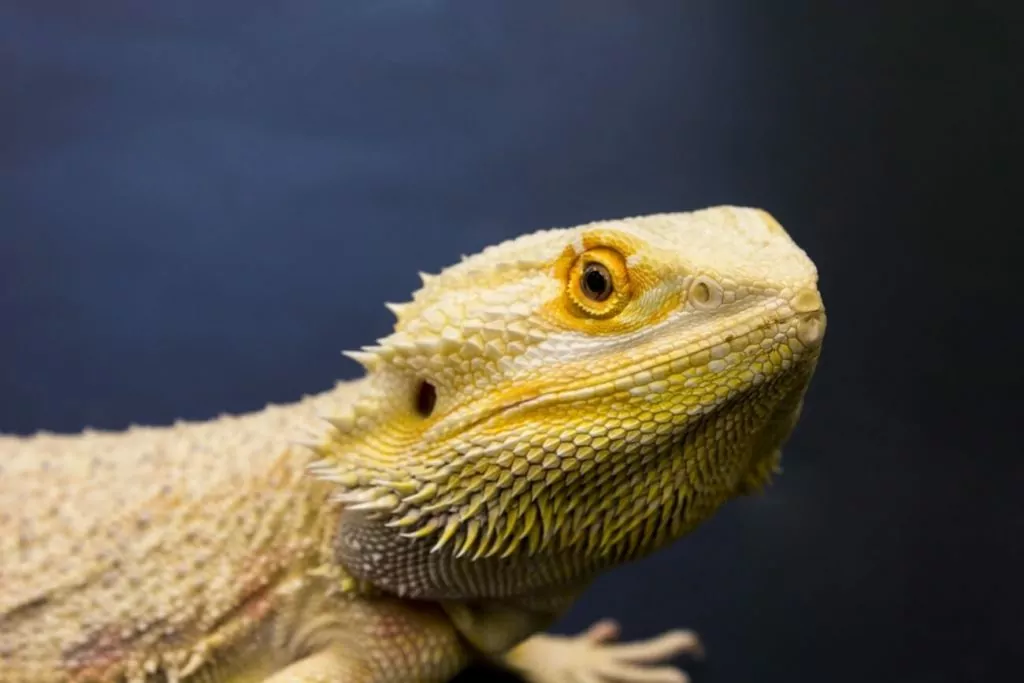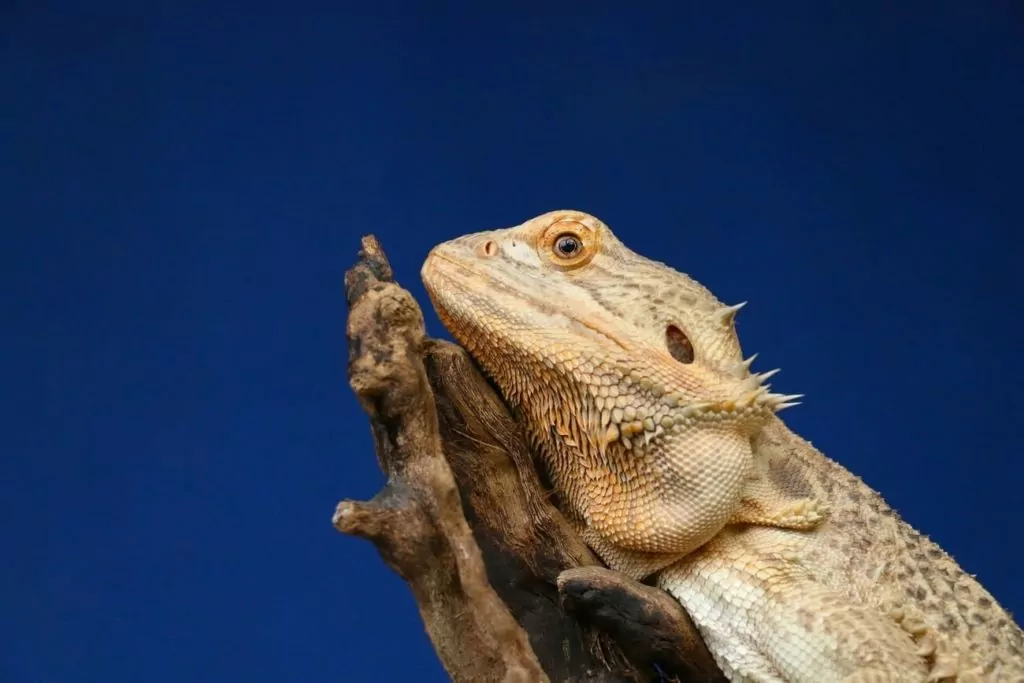The dreaded bearded dragon black beard is something that many owners don’t actually understand. It’s a sign that something is going on, but it can be challenging to figure out what it is!
In fact, some of the reasons why black beards occur in bearded dragons aren’t bad at all.
But there’s a lot of misinformation and fear that gets passed throughout the community, and this is especially true for inexperienced owners. They read on a forum that a black beard means your beardie is toast and they freak out!
So this is what we’re going to do:
This guide is going to cover all the likely reasons why bearded dragon beards turn black. This will allow you to accurately diagnose the cause, and make adjustments if needed.
Table of Contents
Common Reasons
We’ve broken this list into eleven of the most common causes for a bearded dragon black neck. Some of them are pretty harmless, and others are more concerning.
If this is something your beardie is going through right now, use this list as a starting point to see what causes are a possibility. You’ll likely be able to toss out a number of them right away, making your process of figuring out the cause a whole lot easier.
1. They’re Scared
One of the most obvious reasons for why a bearded dragon gets a black beard is fear (this might go hand in hand with puffing themselves up too). In the wild, this is designed to deter a potential threat from messing with them.
In captivity, pet bearded dragons will still use the same tricks when they feel scared. The only difference is that most of the time they’re not in any real danger!
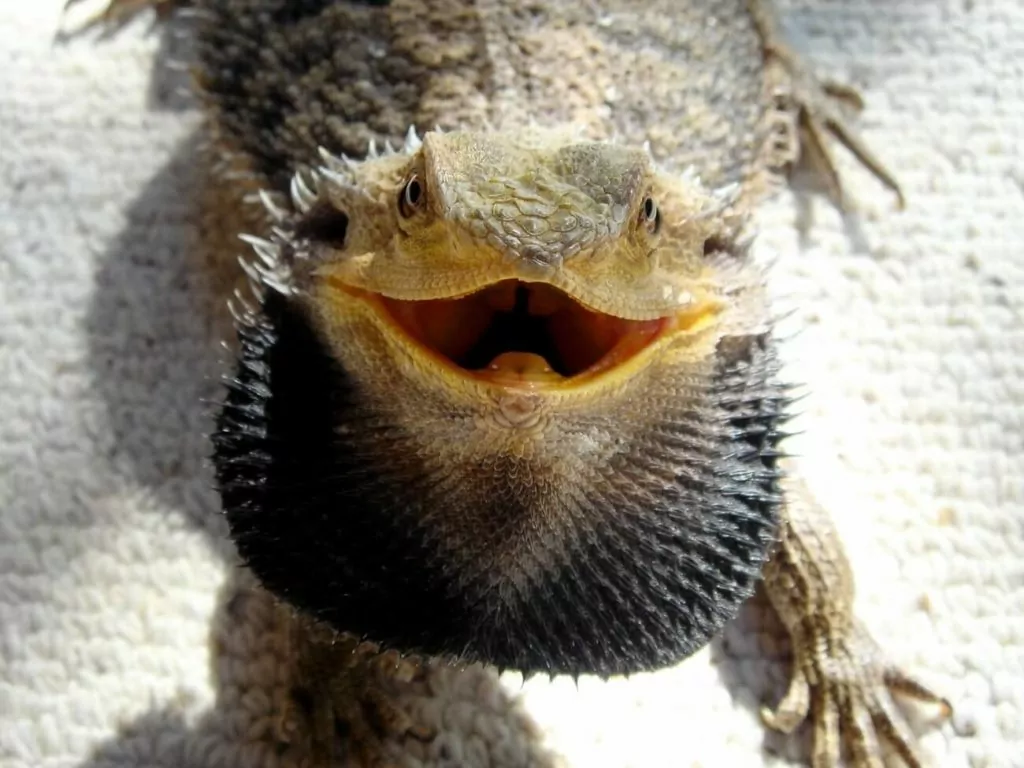
There are a wide variety of common causes for bearded dragons getting spooked. It could be the presence of nearby pets in your home (like a curious cat near their enclosure), or even something you’re doing.
Until a beardie gets truly comfortable with their environment and surroundings they’re actually rather easy to scare. It could be the way you’re acting near their enclosure, a funky shirt that you’re wearing, you name it!
The best thing you can do is to try and provide them with a stable and safe environment that eliminates a lot of variables. Keep their cage away from widows, prevent other animals from getting close, and practice smart and patient handling (more on that later).
2. They’re Angry
This is somewhat related to the reason above, but it’s worth diving into a bit. As you might expect, if a bearded dragon is angry they might turn their neck black to make it obvious to everyone else.
This is a sign that they want to be left alone, and you should abide by their wishes. However, you should also look to see if there’s anything else nearby that might be angering them.
This could be other pets, young kids tapping on the glass of their enclosure, loud noises in the room, or a host of other possibilities. For the most part, it should be pretty easy to figure out what’s bothering them since these reptiles are actually pretty mellow (they don’t like to make a fuss jut for the sake of it).
Your job as a responsible owner will be to identify what’s making them mad and stop it.
Expert Tip: This is obviously not the time for you to try handling them or tidying up their enclosure. Give them some space until they’re calm first.
3. Sickness
This is one of the reasons that many inexperienced owners jump to first. While this is often a panicked reaction, sometimes it is the cause for a bearded dragon turning their neck black.
There are a couple of reasons why a sick bearded dragon might do this.
The first theory is that they’re simply trying to make themselves look as intimidating as possible to hide the fact that they’re actually not feeling well. This is a tactic that many animals use, and it actually works quite well in the wild!
The other reason why a sick bearded dragon might have a black beard is simply due to stress and discomfort. If your beardie is sick enough they’re likely going to be rather uncomfortable. And as we’ve established already, fear and stress can cause them to turn their neck black.
Before you freak out, most of the time there will be additional signs that they’re sick. Lethargy, not eating, irregular poop, and other behavioral changes might indicate that something is wrong.
If your bearded dragon has a black beard but is behaving normally (and the black beard doesn’t stick around for a while), then there’s a good chance they’re healthy.
4. They’re A Bit Chilly
This is actually a pretty neat trick. If a bearded dragon gets a little chilly due to insufficient heat in their environment, they’ll actually try to make themselves darker to warm up!
As you probably know, black objects absorb more heat than white ones. That’s why you always see people who live in extremely hot climates wearing white clothes instead of black.
So, if you see your bearded dragon turn their beard black (and are keeping it that way) it’s probably smart to check the temperature.
Expert Tip: If the temperature looks fine and you’ve ruled out most of the other causes on this list, try fact-checking your thermometer. Inaccurate temperature readings frequently lead to mismanaged care!
If you find that the temperature in their enclosure is too low, make the necessary adjustments to bring it back into the normal level. Check the output of your lamps and UVB lights as well (they might be due for a change).
5. They’re Getting Used To A New Enclosure
A general source of stress with new pet bearded dragons is adjusting to their enclosure. The entire process is obviously quite a whirlwind for them, and the lack of a place they feel comfortable in will only contribute to this.
You see, bearded dragons need some time to get used to a new home and habitat. Even if you’ve set it up properly and given them plenty of space they’ll still need some time to feel like it’s a safe space.
Because of this increased anxiety and fear, they might turn their beards black just to send a message. They don’t believe they are in their territory yet, so the perceived presence of a threat is very strong.
Honestly, the only thing you can do for this is let them acclimate and give them space. As they get more comfortable with their enclosure you can expect their black beard to go away.
6. They’re Seeking A Mate
This probably won’t come as a surprise, but male bearded dragons will regularly turn their necks black as a way to attract a mate.
Males have a darker beard than females and will use this as a way to show off how suitable they would be as a mate. They’ll also move or bob their head to attract further attention.
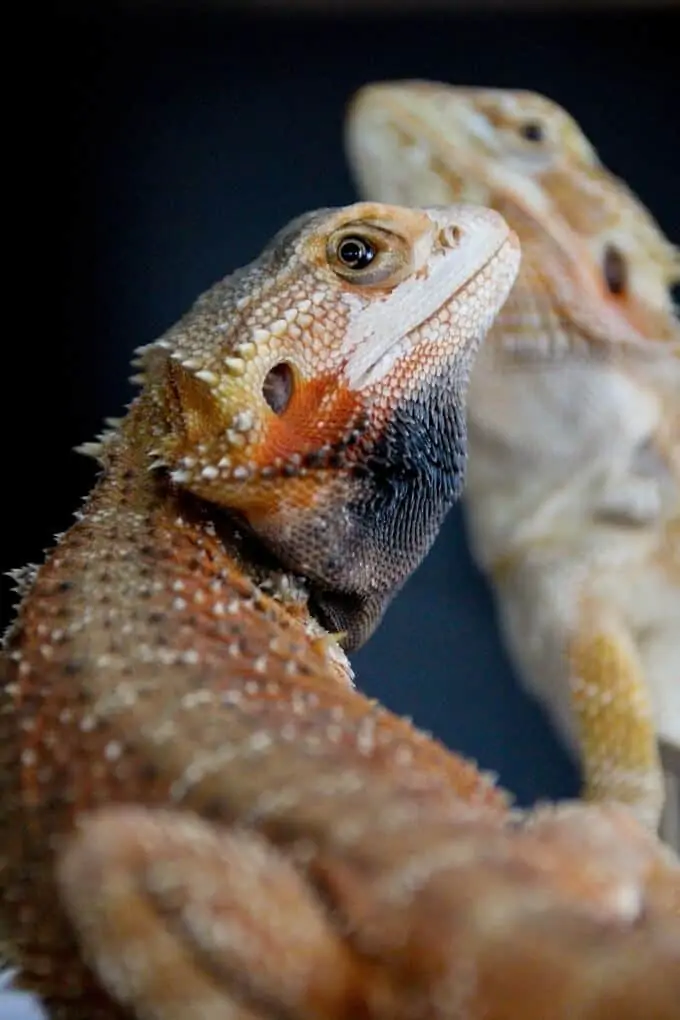
You won’t see this behavior before they reach at least half a year old. This is because they simply can’t mate anytime before then (they’re still growing).
If you don’t have a male and female beardie then you won’t see this behavior, so cross it off the list if that isn’t the case! Also, make sure to look for the other signs of head bobbing or foot-stomping before you attribute the black beard to courtship behavior.
7. Territorial Feelings
This is something that you won’t see unless you’re keeping multiple beardies in the same enclosure, so this won’t apply to you if that isn’t the case.
However, if you are then it’s very possible that the act of turning the beard black is territorial behavior. Male beardies will do this in the wild to signal that they’ve claimed an area for themselves (it’s a very versatile sign).
In captivity, pet bearded dragons might do this if they’re crammed into the same enclosure or if two males are housed together (which is never a good idea). This is a sign that your plan for cohabitation is not going as planned and you need to rethink your strategy.
Beardies do very well on their own which is why we always recommend that you avoid keeping more than one in the same enclosure.
8. They’re Not Comfortable With You
Part of the process when it comes to owning bearded dragons is getting them to feel comfortable with you. When you first get them they have no idea who you are, so they’re obviously not going to trust you initially.
If you rush into this and start trying to handle or interact with them before they’re ready, it’s possible that they might turn their beard black. This means they’re nervous around you and are trying to get you to give them some space.
This is why it’s always a good idea to ease into the process of interacting with your new pet beardie. Give them time to get used to their enclosure, then start slowly increasing the amount of time you handle them.
Expert Tip: There’s no perfect length of time for how long it will take your bearded dragon to get comfortable with you. Always keep an eye on their body language and behavior to see if you need to give them a break.
9. Brumation Is At Work
Brumation is a natural process that bearded dragons go through. Even though it’s not necessary when in captivity, it’s still quite common for them to brumate.
When a bearded dragon has finished this process it’s possible that they might display a black beard while their system is getting back up to speed. They just spent a lot of time resting and might not be too keen on going back to their daily chores!
This isn’t something that will happen all the time. In fact, we would actually say it’s not that common. However, it’s still a possibility that you should be aware of if your beardie has recently brumated.
10. They’re Lonely
This is a cause of black beards in bearded dragons that not many owners know about. In fact, most of the ones we tell this to are completely surprised!
But it’s true. A bearded dragon that’s feeling lonely or in need of some attention might decide to show it by turning their neck black.
This is a difficult cause to figure out because it’s very situational and easy to confuse with other reasons on our list! Our best advice is to look at their recent activity and use your best judgment.
If you just spent some time handling them, this is probably not the cause. But if they’ve been in their enclosure for most of the day without any attention, that might be the reason!
Expert Tip: If you mistake their “I’m scared” black beard for a “please hold me” one, they’ll probably let you know pretty quickly with their body language and behavior. In that situation just place them back in their enclosure and leave them alone.
11. Poor General Care
This is a catch-all section for all of the smaller miscellaneous causes that might result in a bearded dragon turning their beard black.
A suboptimal diet, poor habitat setup, dirty environment, or bad lighting are all things that might upset your beardie. While the most common causes are definitely the ones listed previously, it would be foolish to ignore the possibility of other causes.
If you discover that something about your care plan is not sufficient, be honest with yourself and make the appropriate fix. We truly believe that keeping bearded dragons as pets is a constant learning experience and the only bad owners are the ones who refuse to do what’s best for their pet.
Wrapping Up
We hope that this guide has made you better equipped to figure out why your bearded dragon turns their beard black.
As you can see, there are many possibilities. However, most of them are pretty easy to check off the list.
As time goes on you’ll become better and better at figuring out why your beardie is doing this and what you should do next. It’s just one more puzzle to solve in the fulfilling world of ownership!

